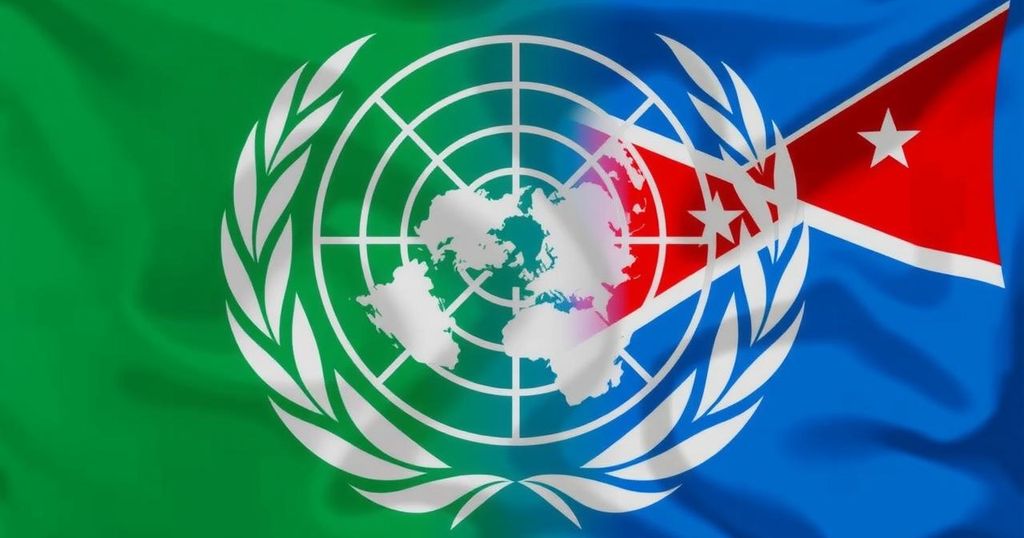Papua New Guinea Declares Boycott of ‘Waste of Time’ UN Climate Summit
Papua New Guinea has announced it will boycott the upcoming COP29 climate summit, labeling the event as unproductive and filled with empty commitments from major polluters. Foreign Minister Justin Tkatchenko emphasized the lack of action taken in the past few years at these meetings and indicated a shift towards pursuing bilateral climate agreements, notably with Singapore, seeking to address the urgent climate crisis more effectively.
Papua New Guinea has officially declared its intention to boycott the upcoming United Nations climate summit, COP29, scheduled for next month in Azerbaijan. The government has condemned the negotiations centered around climate change as a “waste of time,” citing that they are nothing more than empty promises from major polluting nations. Foreign Minister Justin Tkatchenko articulated the nation’s frustrations, stating, “There is no point going if we are falling asleep because of jet lag and yet not accomplishing anything.” He criticized the current climate talks, emphasizing that despite commitments by leading polluters to contribute financially towards climate aid, much of the assistance is wasted on consultancy fees rather than tangible action. Papua New Guinea, recognized for its vast rainforest—considered one of the planet’s critical carbon sinks—finds itself in dire need of effective climate action amid its vulnerability to natural disasters intensified by climate change. Tkatchenko has stated, “COP is a total waste of time,” expressing discontent with the stagnation observed over recent years in international climate negotiations. Historically, COP summits have yielded significant outcomes, notably the landmark 2015 Paris Agreement. However, there exists a growing sentiment among various nations that the established framework favors major polluters, obstructing meaningful progress on climate initiatives. Detractors have noted issues such as sluggish bureaucratic processes affecting adaptation funds set aside for developing countries. The call for a boycott from Papua New Guinea emerges as an emphatic statement, with Tkatchenko articulating that many smaller island states have felt ignored in the discussions and negotiations that take place at such summits. Instead of participating in COP, Papua New Guinea has opted to pursue independent climate agreements through bilateral collaborations. It is currently engaging with Singapore to explore constructive partnerships to address climate concerns and diminish carbon emissions. A recent preparatory meeting prior to COP29 left many participants feeling frustrated, with insufficient advancements made towards funding agreements aimed at supporting poorer nations. The ongoing crises faced by low-lying Pacific countries demonstrate a pressing need for prompt and effective climate action, further underscoring Papua New Guinea’s dissatisfaction with the current international approach.
Papua New Guinea, residing in the Pacific and renowned for its expansive rainforests, faces significant threats from climate change, which exacerbates its vulnerability to natural disasters. The backdrop of this decision lies in the growing frustrations with international climate negotiations, often dubbed COP (Conference of Parties), which are believed to have fallen short of delivering substantial progress or serious commitments from major greenhouse gas emitters. The country’s leaders, particularly Foreign Minister Justin Tkatchenko, have voiced their concerns regarding perceived inaction and the rhetoric surrounding these essential talks, shifting their focus toward bilateral negotiations that may yield more effective results.
In light of growing disillusionment towards the COP processes, Papua New Guinea’s decision to boycott the upcoming climate summit reflects a critical stance against the inefficacy of international climate negotiations. By prioritizing bilateral talks with like-minded nations, Papua New Guinea aims to establish more actionable climate agreements rather than remaining part of a system characterized by unmet promises and bureaucratic stagnation. This move signifies an appeal for greater recognition and tangible cooperation from the global community, particularly in protecting vulnerable nations from climate challenges.
Original Source: www.rfi.fr




Post Comment